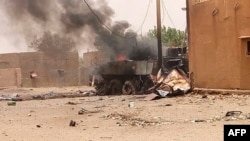The Accra Initiative of seven West African countries is meeting in the Ghanaian capital Thursday to discuss ways of preventing the spillover of terrorism from the Sahel region. Islamist militants have gradually spread their activities from Niger to Burkina Faso and Mali to West Africa's coastal states.
Over the years West Africa has dealt with chronic instability caused by political crises and cross-border terrorism.
Five West African countries — Benin, Burkina Faso, Côte d’Ivoire, Ghana, and Togo — established the Accra Initiative in 2017 in order to collaborate against violent extremism in the region.
Mali and Niger were admitted as observers before becoming members in 2019.
The program promotes information sharing, training of security and intelligence personnel, and cross-border military operations in an often-volatile region.
Speaking to VOA on the sidelines of the two-day conference in Accra Thursday, Ben Dere, the executive secretary of the Accra Initiative, said cooperation among countries is key in the fight against terrorism.
“We will sustain confidence through the efforts that we are making and closer collaboration between the member states of the Accra Initiative and some partners that are already working in the area, so that we all get to know that one group of people cannot work without the other. Fighting terrorism is a collective effort so we need to work together to continue to engage, and we shall succeed in whatever we are trying to do,” said Dere.
So far, the Accra Initiative has resulted in little tangible action. In 2018 and 2019, member countries conducted joint military operations on their borders which resulted in the arrests of about 700 suspected terrorists and gang members, and the seizure of homemade weapons.
Since then, the threat of jihadist groups has only grown. Ghana’s minister of state security Albert Kan-Dapaah said that between July 1st and September 30th of this year alone, there were 264 recorded terrorist attacks in West Africa, resulting 745 deaths.
Kan-Dapaah called on member states and the international community to continue the dialogue to come up with a more proactive approach in fighting terrorism.
“The Sahel and in fact the entire West African region are going through a very difficult moment in history due to the ongoing rapid spread of terrorism and the violent extremism, and it’s in recognition of the debilitating impact of the threat of terrorism and violent extremism on countries and the international communities that terrorism-related issues have in recent times featured prominently in security discourse on national and international levels,” said Kan-Dapaah.
Participants in this week’s meeting include officials from the European Union, ambassadors from the member states, traditional leaders and some regional military officials. The conference is expected to culminate in a summit of member countries’ heads of state and government.




